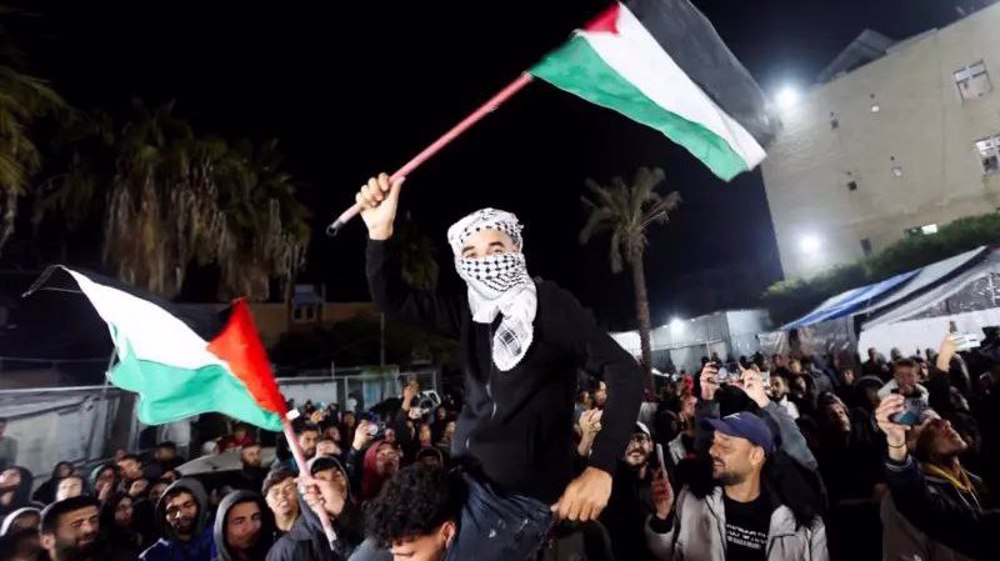Europeans created Daesh, Iran stopped its spread: Qassemi
Iran says Daesh would have overridden Europe if it had not been for the Islamic Republic's fight against terror groups that Western countries once planted in the Middle East to further their own agenda.
“European governments and intelligence services know very well that Europe owes its security today to Iran’s efforts,” Iranian Foreign Ministry spokesman Bahram Qassemi said Sunday.
“We saw what terrorist and Takfiri outfits did on the streets in Paris and other European capitals and how they caused insecurity and violence,” he said, referring to deadly attacks by Daesh sympathizers.
Read More:
- France declares 3-day national mourning after terrorist attack kills 84 in Nice
- UK intelligence failed to prevent 2017 Manchester attack by Daesh
Qassemi said Daesh and other terrorist groups were nearing their demise thanks to Iran’s struggle.
“Iran has been serious in its fight against terrorism, so much so that today we see terrorists have been purged from most territories in Syria and Iraq,” he said.
“However, we believe despite their decline, terrorism still exists and a serious resolve and a global coalition are required to eradicate them,” he added.
Iran has been actively providing the governments of Iraq and Syria with military advice to push back against foreign-backed militants who have been terrorizing both countries using support from Western countries and their regional allies.
Qassemi said the spread of Daesh and other groups into Europe was in large part due to the European governments' own actions.
“The terrorists were first nurtured, developed and armed in this very region by certain parties and then caused terror and panic in Europe using the funds they had been provided with.”

The spokesman blasted Europe’s double policy in dealing with terrorist groups, something he said had left an adverse effect on their image among their own people.
“Europeans’ instrumental use of terrorism is nothing new and they divide terrorists into good and bad categories,” Qassemi said.
“We believe we should not practice multiple standards in fighting terrorism… and only defend certain groups to serve our own interests,” he added.
The spokesman said Europe‘s double standard was best demonstrated in Syria, where it first supported a terrorist push to topple President Bashar al-Assad but changed its position when it realized its mistake.
Those policies, he said, have encouraged many European citizens to join Daesh without facing serious consequences back home.
Qassemi said all Europe needed to fight terrorism was “determination” because it already has complete knowledge of the terrorist groups’ “nature, action and funding channels.”
UK ban on Hezbollah example of double standards
Qassemi also referred to Britain’s recent move in blacklisting Lebanese resistance movement Hezbollah as a terrorist group as a bare example of European double standards.
“Hezbollah, like many freedom fighters and those who are trying to bring independence and security to the region, has made great sacrifices in the fight against terrorists and Takfiri groups and is very popular in Lebanon and other countries of the region,” Qassemi said.
“The UK’s move is unfathomable and seems like they are following the same double standards that have led to insecurity, instability and extremism across the region,” he added.
‘Bolton suffering from lethal anti-Iranian disease’
Qassemi also addressed reports about US National Security Adviser John Bolton’s upcoming trip to Australia as part of his efforts to shore up support for Washington’s pressure on Iran.
“Forming coalitions against Iran is a normal routine for Bolton,” he said. “He is touring the world while trying to beg for hostility towards Iran.”
“We believe he really is suffering from an anti-Iranian disease. He wrongfully thinks Iran is going to ambush either him or the US,” Qassemi said.
“Bolton’s grudge and animosity toward Iran has gone beyond what is expected from a politician and apparently has turned into a lethal disease that needs a serious treatment,” he continued.
Bolton has gained notoriety for spearheading US pressure campaigns against Iran under President Donald Trump as well as the past US administrations.
He famously said in 2017 that the Islamic Revolution of 1979 would not be around to celebrate its 40th anniversary in 2019. On February 11, however, millions of Iranians thronged streets across the country to mark the occasion.
Hamas thanks Iran, Resistance Front following achievement of ceasefire in Gaza
'Capitulation': Israeli officials and media concede Gaza defeat as truce unfolds
'Gaza has won': Social media users react to ceasefire with mix of relief, joy
Iran seeks South Korea’s assistance for AI, fiber-optic projects
VIDEO | Iran's 'Eqtedar' (Power) maneuver
Israel hits HTS military target in Syria for 1st time since fall of Assad
VIDEO | Press TV's news headlines
Israel has slaughtered 13,000 students in Gaza, West Bank












 This makes it easy to access the Press TV website
This makes it easy to access the Press TV website